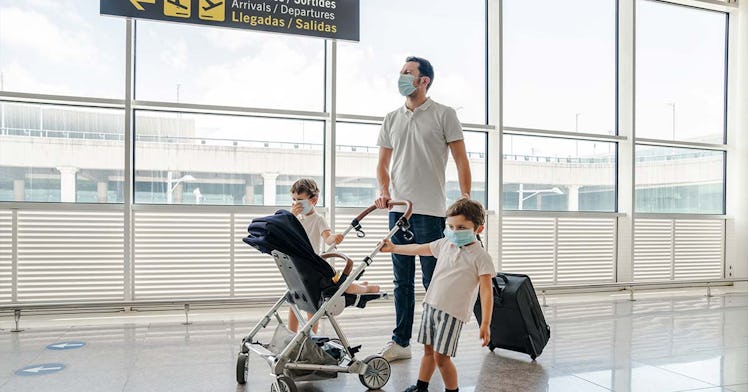6 Tips from Medical Experts for Your First Post-Pandemic Flight
Summer travel is here. But is your family ready for your first post-pandemic expedition?

A lot has changed in the past month.
More than a year after the Covid-19 sent kids home from school, shuttered businesses, and pulled the emergency brake on travel, the U.S. Centers for Disease Control and Prevention has loosened its travel guidance, saying that fully vaccinated people can travel without quarantining or testing. The agency has also recommended Pfizer’s Covid vaccine for kids over 12 and announced that vaccinated people can safely go mask-free in most settings.
Sounds like time to jump on a plane, right? Not so fast, experts say. The new guidance changes some aspects of travel, but for families with children under the age of 12, a lot remains the same.
“Vaccinated parents should still not travel with unvaccinated children,” says Dr. Gary Kirkilas, a pediatrician at Phoenix Children’s Hospital and spokesperson for the American Academy of Pediatrics.
While the vast majority of children who catch Covid have mild or no symptoms, it is still a risk, he says.
More than a third of adults in the U.S. are fully vaccinated. Though that’s not enough to get us to herd immunity, Dr. Kirkilas expects that the CDCs travel advisory will be lifted once more people are inoculated and infection rates plunge.
Here’s what you should consider for your first post-pandemic flight, whether it’s next week or later this year.
Make sure everyone is vaccinated
Dr. Kirkilas recommends that everyone in your family who is eligible gets vaccinated, as well as anyone you’re planning on visiting. Now, that includes kids 12 and up, who are cleared for Pfizer’s vaccine.
“Many COVID infections come from household contacts,” he says. “Knowing you’re vaccinated not only brings the benefit of immunity, but also a peace of mind so that you can enjoy your vacation.”
Look for direct flights
Flying nonstop will limit the need to change planes and walk through busy airports, Dr. Kirkilas said. In addition, he said, the shorter the flight the better—it means less time in close quarters with other individuals.
Pack extra masks and hand sanitizers
Along with your stroller, car seat, beach toys, and sun hats remember essentials such as masks, hand sanitizers, and disinfectant wipes.
The CDC is still advising that everyone wear masks on planes, buses, trains, or other forms of public transportation—travel is still a major means of virus (and variant) spread. And experts say hand sanitizer is smart regardless of whether Covid is in the picture or not.
Dr. Kirkilas recommends packing at least two masks per child, in case one gets lost or needs to be washed. “When packing hand sanitizer, choose one that contains at least 60 percent alcohol and include a small dispenser that can be stored in a purse or backpack as well as a larger container for refills,” he says.
Eat before boarding
If possible, it’s a good idea to have a substantial meal before your flight, so that you don’t have to take off your mask when you’re sitting so close to fellow travelers. If you choose to eat inside the airport, Kayla Percy, a pediatric nurse practitioner with Chiricahua Community Health Centers in Arizona. recommends making sure you are six feet away from other travelers.
Check Covid transmission rates
The more Covid is spreading, the higher your family’s risk of being exposed to the virus, Dr. Kirkilas says. He recommends checking the Covid transmission rates in your destination before traveling; CNN’s site which lets you search by zip code.
“If the intended destination has a high rate of spread, families should be extra cautious when they are out in public,” he says. This means wearing a mask at all times and continuing practicing social distancing.
Remember, the pandemic is not over
There’s definitely light at the end of the tunnel, but Covid isn’t in the past just yet. Experts say this is not the time to drop your guard.
“Remember that the vaccine may not protect you from all variants of the virus, but it is still the best way to protect you and your family,” Percy says. If you do decide to travel, keep following public health recommendations and maintain some space between you and other people—you’ll keep family safer, as well as everyone else’s.
This article first appeared on The Expedition. Check out The Expedition’s travel subscription deals here.
This article was originally published on